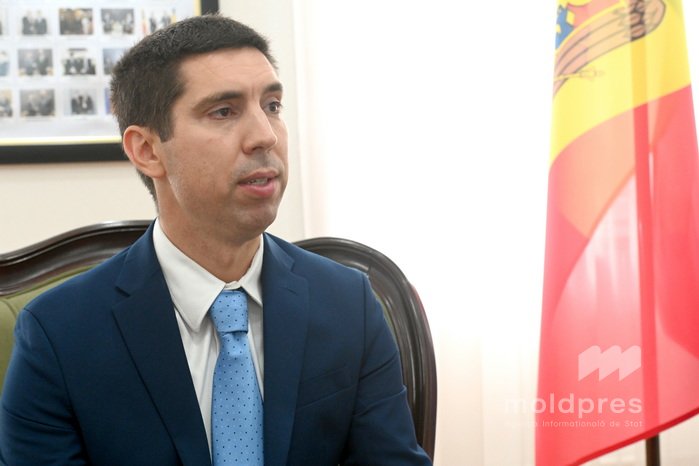
Moldovan foreign affairs minister says reintegration of Transnistria to be peaceful through region's economic integration into Moldova, European Union
Moldova stays firmly committed to a peaceful solution for the resolution of the Transnistrian conflict, based on the economic and constitutional reintegration of the region on the left bank of the Dniester, Foreign Minister Mihai Popsoi has said at the Conference on the enlargement report.
"There is a single solution for the Transnistrian file – the peaceful one, through the economic reintegration of the region. Last year marked an important step, for the first time since independence, when economic agents from the left bank of the Dniester were subjected to customs taxes. For 30 years, they have only enjoyed advantages without contributions. Through this measure, the government sent a clear signal: reintegration must be based on mutual responsibility,” emphasized Popsoi.
He also said that Moldova enjoyed the support of international partners, especially the European Union, in order to create the necessary conditions for returning the Transnistrian region to the constitutional space of the country.
"As Moldova aligns closer with the European Union, our country's attractiveness increases, and more and more residents from the left bank of the Dniester start to see the real benefits of this path. (...) We see that as the support or subsidies that were for the region on the left bank of the Dniester decrease, the economic difficulties increase, and we know that a good portion of citizens come to the right bank of the Dniester to work,” noted Popsoi.
Mihai Popsoi highlighted the significant progress made by Moldova in the field of energy security.
"Our country is no longer dependent on Russian gas or on electricity produced on the left bank of the Dniester. This energy independence allows us to implement more dynamic and firm integration policies than in the last 30 years,” the minister said.
The minister underlined that Moldova now had more effective control over the Moldovan-Ukrainian border on the Transnistrian segment and that progress in energy security consolidated the reintegration process.
"We are no longer dependent on Russian gas and neither on energy from the left bank of the Dniester. Energy independence allows us to apply firmer and more dynamic reintegration policies,” the minister stressed.
He also recalled the support provided by the European Union during the energy crisis, including for the residents of the Transnistrian region.
"There is no doubt that, even those with more deeply rooted, pro-Russian views on the left bank of the Dniester, change their opinions, when your child freezes in the house in the middle of winter and you know that until recently the Russian Federation offered you gas and today it does not. And the European Union, the taxpayers from the European Union, provided money to help you and your children not to actually freeze in the middle of winter. This gesture of generosity and political support on behalf of the European Union, which were provided last year, will certainly, over time, create circumstances where a good deal of the citizens from the left bank of the Dniester, who are already questioning the reality they are in, become stronger supporters of reintegration, as they have only benefits to gain from this process. And this fact becomes increasingly clear,” concluded the minister.
Moldovan foreign affairs minister meets Armenian counterpart; expansion of economic, investment cooperation on agenda
Polish president says Poland consistently supported Moldova, this not to change
Moldovan president says Poland has strong, reliable voice in Europe, Moldova fully committed to this path
Moldovan President visits Katyn Massacre Museum: History helps us understand and cherish freedom
Olympic vice champion gives up parliamentary mandate, returns to sport
Deputy Prime Minister on working visit to Strasbourg
Speaker: 167 years since Little Union, first step towards modern Romanian state
Moldova inaugurated Honorary Consulate in Canadian Province of Quebec
More legislative transparency in Moldova's parliament: equipment for live broadcast to be upgraded with Switzerland's support
VIDEO // President of Romania after European Council meeting: Moldova - sovereign state, we respect sovereignty expressed by citizens’ opinion
Chișinău parliamentary delegation participates in PACE winter session
Speaker after drone detected in southern Moldova: Russian ambassador must be summoned
Speaker comments on detention of Moldovan ‘spy’ in Moscow
Deputy Prime Minister explains why Russian Federation’s ambassador not accredited: Decisions must take consequences into account
Prime Minister pays working visit to Ștefan Vodă district
Germany and Romania support European path of Moldova
VIDEO // Three prosecutors dismissed by CSP decision
President of Romanian Senate about establishment of trilateral Chamber of Commerce: Romania, Moldova and Ukraine - pillars on NATO’s Eastern Flank
PHOTO // Deputy Prime Minister in Strasbourg: Moldova committed to addressing gender-based disinformation as threat to democracy
Meteorologists forecast fog, black ice, mixed precipitation in north Moldova for January 29
VIDEO // Foreign affairs minister says Presidency held by Moldova to continue to promote unity, resilience, stronger Europe based on democracy, rule of law
Deputy PM, deputy chief of Mission of U.S. Embassy in Moldova analyze prospects for Moldovan-American cooperation in infrastructure
Moldovan finance minister says mayoralties to adjust tax rates in line with citizens’ means
PM has meeting with Austria’s Ambassador to Moldova
Moldovan parliament convenes at first plenary meetings of spring session
Deputy PM for reintegration meets Ambassador of Slovakia to Moldova
Moldovan parliament speaker says peaceful settlement of Transnistrian conflict stays top priority
Travel advisory for North Macedonia: freight carriers’ protests at border crossings
Moldovan interior minister says authorities do not rule out that Alexandru Pinzari might leave country through Transnistrian region
Online lessons, in-person attendance or later make-up classes: how schools of Moldova operate nationwide on January 28

